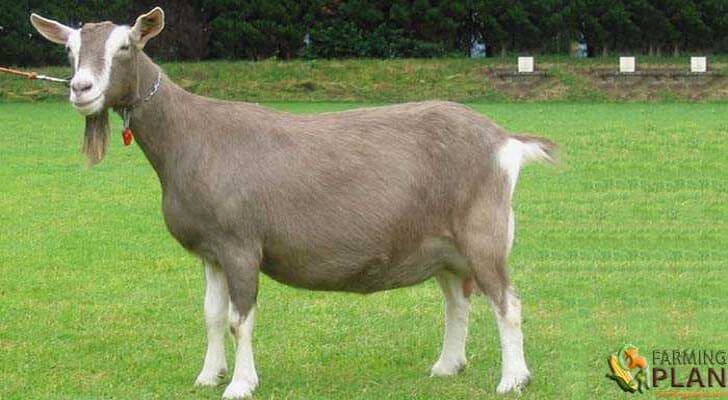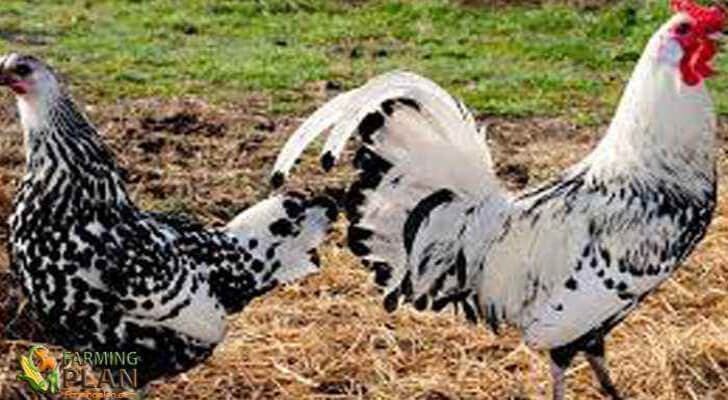The Speckled Sussex Chicken is a friendly and adaptable bird that has captured the hearts of backyard chicken keepers around the world. It is renowned for its striking speckled plumage as well as its highly docile and affectionate nature, and this ancient British chicken breed has been valued for both egg production and meat quality, and is thus a great double-purpose bird for backyard flocks and small farms. Through its friendly and placid temperament, the Speckled Sussex not only makes for a beautiful addition to any flock but also makes a consistent producer of eggs, laying as much as 6 large, pale brown eggs in a week’s time. Be you seasoned farmer or beginner on the hunt for a robust yet friendly breed that will bring vitality to your flock, the Speckled Sussex is both aesthetically appealing and practical.
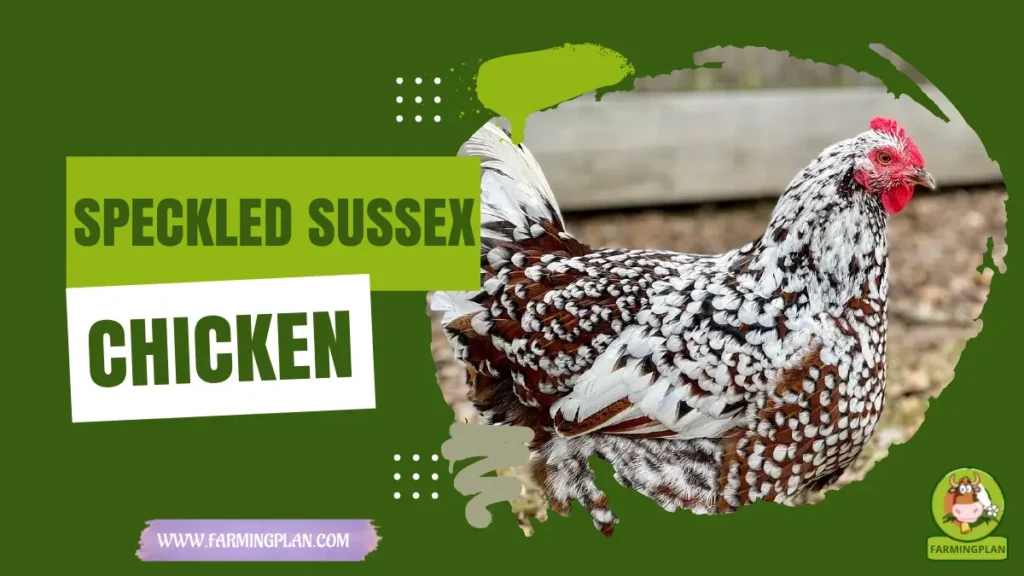
History & Origin
The Speckled Sussex Chicken has a long history that goes back to the early 19th century in Sussex, England, where it was first bred. It is one of the general family members of the English chicken breeds and was established mainly for its double-purpose abilities, being skilled at both meat production and egg laying. Throughout the years, the Speckled Sussex has continued to be favored due to its best characteristics and adaptability, thus its presence on breeding farms as well as in backyard flocks. The breed was originally utilized by English poultry breeders since it was able to thrive on changing weather, from the cool and temperate climates to the more changeable English country weather. This heritage bird has kept up its robust performance in heritage conservation breeds, promoting its ongoing contribution to modern-day poultry production.
Characteristics
The Speckled Sussex Chicken is a medium-sized bird that is highly valued for its distinctive and beautiful appearance. Its most distinctive feature is the beautiful white speckles that adorn its feathers, giving it a rich mahogany bay color that shines in the sun. The breed has a broad body with large shoulders and a drawn-back back, making it a sturdy and strong bird.. Adult Speckled Sussex pullets typically weigh around 6-7 pounds, while the roosters are slightly larger at up to 8 pounds.
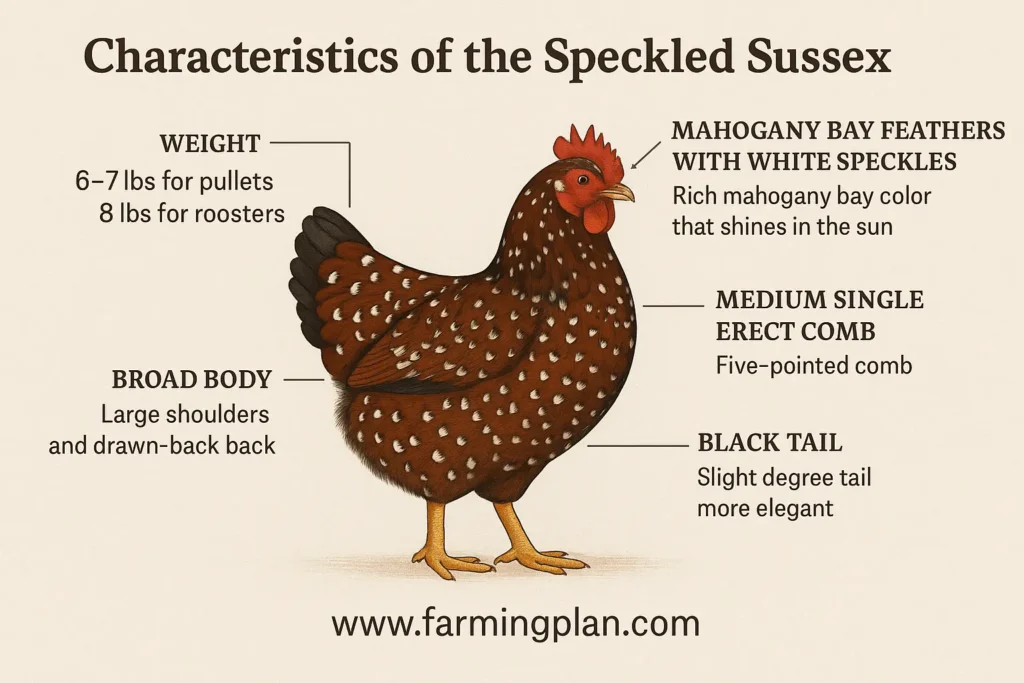
It is also characterized by its five-pointed comb, a medium single erect comb on the head of the bird. Its tail can be black with a slight degree tail, making it more elegant. The Speckled Sussex Chicken comes in numerous color patterns, with some having darker brown speckles and others with lighter tints. This breed’s friendly and easy-going temperament, combined with its distinctive coloring, makes it one of the top chicken breeds to be kept in mixed flocks and among chicken keepers.
Nature/Temperament
The Speckled Sussex Chicken is highly renowned for its calm nature and amiable temperament and is thus an ideal bird for both novice poultry keepers and seasoned farmers. Naturally docile and friendly, these birds will coexist peacefully with other chickens in a multi-bird flock. In contrast to some of the more violent breeds, the Speckled Sussex is not a violent bird and is generally a quiet and curious bird in the flock. The friendly bird is also very interactive with humans and enjoys the affection of its owners and will even go out of its way to solicit gentle stroking.
While they are generally docile and not flighty, Speckled Sussex hens will also show some curiosity, and they are thus fun to watch as they hunt around. They are excellent foragers, which is why they are perfect for free-range systems, where they can make the environment healthy by helping control pests. Their friendly nature also makes them the preference of family flocks or hobbyists who enjoy having chickens as pets.
Read More: Sebright Chicken: The Beautiful and Friendly Bantam Breed
Food & Diet
The Speckled Sussex Chicken is a low-maintenance breed with respect to feeding, as it thrives on a healthy, balanced feeding regime. In order to keep their normal egg production and meat quality, one has to feed them a mixture of high-quality poultry feeds like seeds, grains, and vegetables. These birds are active foragers, and thus they can manage well with free-range exposure to areas where they can access insects, plants, and other wild foods. However, for optimum health and egg laying, they should be supplemented with layer feed that is rich in calcium and protein.
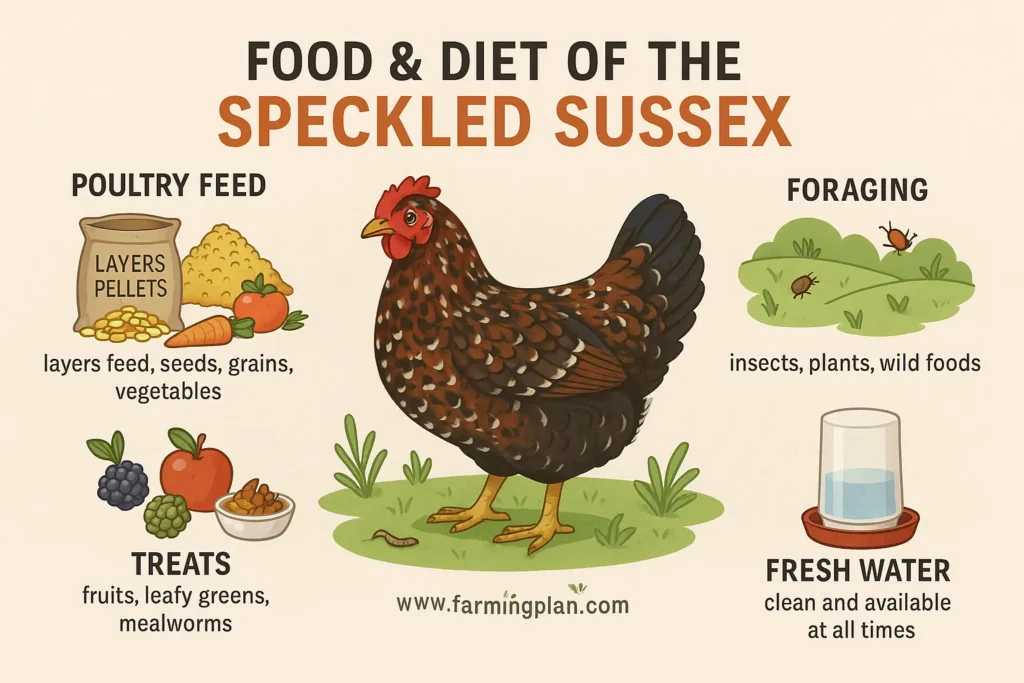
In addition to standard feed, Speckled Sussex chickens enjoy occasional treats such as fruits (like berries and apples), vegetables (especially leafy greens), and mealworms. These treats should be given in moderation to avoid overfeeding and to maintain their health. Avoid feeding chickens items that are harmful, such as onions, chocolate, or raw potatoes, as these can cause health issues.
Providing fresh, clean water at all times is essential, especially during hot months. To ensure optimal growth and egg-laying rates, make sure to offer a balanced diet that supports their active foraging habits while keeping them healthy and productive.
Usage/Purpose
The Speckled Sussex Chicken is an extremely versatile breed and as such a wonderful choice for a variety of purposes on the farm or in the backyard. It is a dual-purpose bird that has a good performance in egg production as well as meat quality, providing much benefit to farmers as well as chicken keepers. Speckled Sussex pullets are prolific egg layers that will lay 4-6 large light brown eggs per week and hence a great source of fresh eggs for domestic use or even small-scale sale. This breed is specifically famous for its ability to lay eggs with a consistently good egg-laying ability that remains unaffected by climatic conditions throughout the year.
Other than laying eggs, Speckled Sussex chickens are also a fine second source of meat. They have soft, palatable meat that many people prefer to raise their own for eating. The friendly and gentle nature of the birds also makes them suitable for backyard flocks as pets and reliable egg and meat supplies.
This breed’s adaptability to various environments, from cold environments to more temperate climates, makes it a great addition to poultry breeding farms or hobby farms. Whether you’re looking for a consistent egg layer, a meat source, or a friendly bird for your family flock, the Speckled Sussex Chicken fits the bill perfectly.
Read More: Andalusia Azul Chicken: The Unique Chilean Breed You Need To Know About!
Special Features
The Speckled Sussex Chicken stands out for several unique traits that have earned it a spot among favorite breeds with poultry enthusiasts. Perhaps its most striking feature is its speckled feathers, which add a pop of color to any group of chickens. The glimmering mahogany bay with its white speckling creates a bird that’s an eyeful, so it’s a favorite among Exhibition Poultry and shows.
Beyond its beautiful appearance, the Speckled Sussex is also a friendly and playful chicken with an excellent attitude. It is a curious and inquisitive breed that would love to explore its environment, and it’s guaranteed to be a fascinating addition to any backyard or farm flock. The Speckled Sussex has a pleasant temperament as well, which makes it easy for the bird to integrate with other chickens and even other pets. Unlike some other more flighty breeds, the Speckled Sussex is calm even in the face of new environments.
Another special feature of the Speckled Sussex is its adaptability. It thrives in various weather conditions, from cold environments to warmer climates, thanks to its hardy nature and medium-sized frame. Whether you’re raising them in a poultry breeding farm or in a backyard coop, these birds are sure to thrive with minimal intervention.
Read More: Aseel Chicken: The Most Dominate Chicken Breed In The World
Health Issues & Prevention
The Speckled Sussex Chicken is generally a hardy and healthy breed, but like all chickens, it can be susceptible to certain common poultry health issues. Understanding these potential health concerns and knowing how to prevent them will help ensure that your birds remain healthy and productive for years to come.
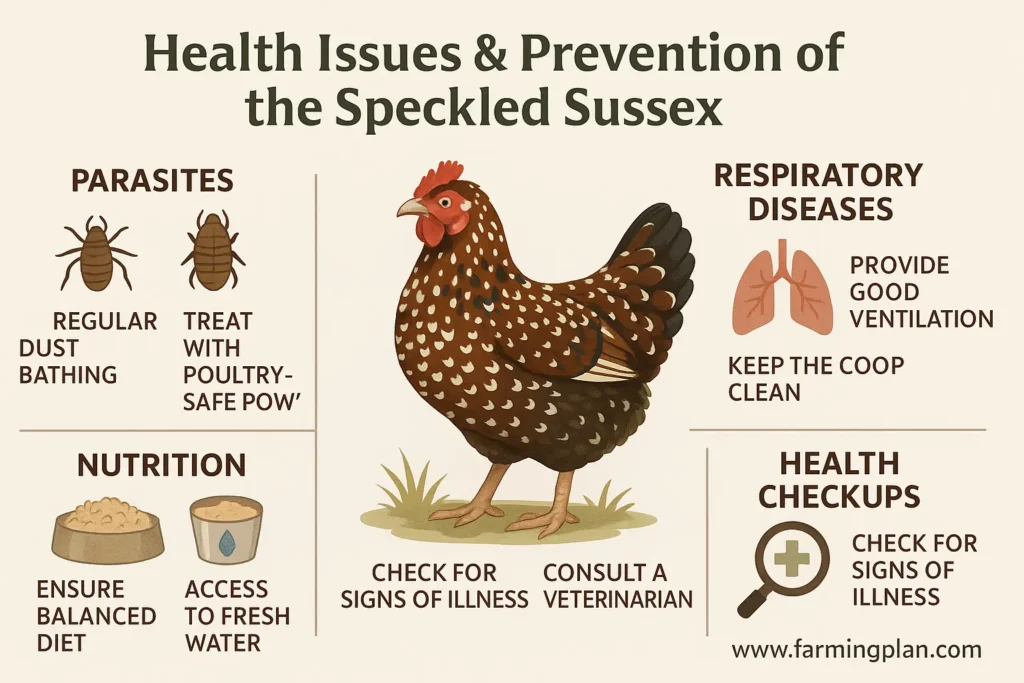
One common issue in chickens is parasites, such as mites and lice, which can cause discomfort and health problems if left untreated. Regular dust bathing can help prevent these pests, as it allows chickens to naturally rid themselves of parasites. If an infestation occurs, you can treat the birds with poultry-safe powders or consult with a veterinarian for more serious cases.
Another health concern is respiratory diseases, such as Newcastle Disease or Infectious Bronchitis, which can spread quickly in flocks. To prevent these, ensure that your Speckled Sussex chickens are housed in a well-ventilated coop and are kept in clean environments. Regular cleaning of the coop, as well as providing proper biosecurity measures, such as limiting contact with outside birds, will help reduce the risk of these diseases.
As a heritage breed, the Speckled Sussex Chicken is generally less prone to the genetic issues that can affect more commercially bred chickens. However, maintaining proper nutrition and ensuring that your flock has access to fresh water and a balanced diet will help keep them strong and resilient.
Regular health checkups are recommended to spot early signs of illness, such as lethargy, loss of appetite, or abnormal behavior. If any of these signs appear, it’s important to consult a veterinarian specializing in poultry to diagnose and treat the problem early
“Add A Touch Of Beauty And Productivity To Your Flock With The Speckled Sussex Chicken – Where Nature Meets Practicality In Perfect Harmony!”
Step-by-Step Farming Guide/Pet Owner Care Guide
Caring for Speckled Sussex chickens is a rewarding experience, as they are friendly, curious, and adaptable birds. Whether you are raising them for egg production, meat production, or simply as pets, it’s essential to follow a comprehensive care guide to ensure they thrive. Here’s a step-by-step guide for Speckled Sussex chicken care:
Set Up a Proper Coop
Ensure your Speckled Sussex chickens have access to a secure, well-ventilated coop. The coop should provide protection from predators and extreme weather. Make sure the coop is large enough to accommodate the size of your flock, with enough space for them to move around comfortably. A medium-sized breed like the Speckled Sussex needs about 2 to 3 square feet per bird inside the coop. Provide roosting bars and nesting boxes for them to lay their light brown eggs.
Provide Adequate Space for Free-Range
As active foragers, Speckled Sussex chickens benefit from free-ranging during the day. They enjoy exploring their surroundings and finding insects, seeds, and plants. If possible, let them roam freely in a secure, enclosed yard or poultry pen. This also helps to reduce feed costs while keeping them happy and healthy. A mixed flock setup with other compatible breeds is also a good option for social interaction.
Feed a Balanced Diet
Make sure to provide high-quality poultry feed, specifically designed for layer hens. Supplement their diet with occasional treats like fruits, vegetables, and mealworms. Avoid giving them harmful foods like onions or chocolate. Fresh, clean water should be available at all times to keep them hydrated and support egg-laying rates.
Maintain Cleanliness
Regularly clean the coop and replace bedding to maintain a clean environment. A clean coop reduces the risk of diseases like respiratory issues and parasites. Ensure that nesting boxes are cleaned and lined with straw or wood shavings to keep the eggs clean and safe.
Monitor Health and Behavior
Regularly check your Speckled Sussex chickens for any signs of illness or distress. Watch for lethargy, changes in appetite, or abnormal behavior. Check for external parasites like mites and lice by observing their feathers. If you notice any symptoms, consult with a poultry vet to address the issue quickly.
Protect Against Predators
Use secure fencing and a covered pen to protect your chickens from predators such as hawks, foxes, and rodents. It’s important to ensure your chickens are safely enclosed during the night, as they are more vulnerable when roosting.
Ensure Proper Lighting
During the colder months or in darker climates, you may need to provide artificial light to ensure consistent egg production. Aim for at least 14-16 hours of light per day to maintain a steady egg-laying rate. Too little light can reduce their egg output.
By following these steps, you can ensure that your Speckled Sussex chickens are happy, healthy, and productive members of your flock, whether you are raising them for egg production, meat, or as beloved family pets.
FAQ
What color eggs do Speckled Sussex chickens lay?
Speckled Sussex hens lay large, light brown eggs. The shade can vary slightly, from a creamy light brown to a richer, deeper brown, depending on factors like diet and age.
Are Speckled Sussex chickens good foragers?
Yes, they are excellent foragers. Their inquisitive nature makes them adept at finding insects and plants, which can help reduce feed costs and keep them healthy.
How cold-hardy are Speckled Sussex chickens?
Speckled Sussex chickens are quite hardy in cold weather. Their dense feathering and robust build help them withstand colder temperatures, making them suitable for winter conditions.
Do Speckled Sussex chickens get broody?
Yes, they are known to go broody. Hens of this breed are excellent mothers and will often set well and care for their chicks diligently.
How much space do Speckled Sussex chickens need?
While they can tolerate confinement, Speckled Sussex chickens thrive in free-range environments. Providing them with ample space to roam and forage will keep them happy and healthy.
Conclusion
Sussex_chicken chickens are a versatile and friendly breed, well-suited for both egg and meat production. Their striking plumage, calm temperament, and adaptability to various climates make them a popular choice for backyard flocks. Whether you’re seeking reliable egg layers or a hardy meat bird, the Speckled Sussex offers a blend of beauty and utility that can enhance any poultry operation.

